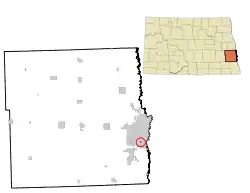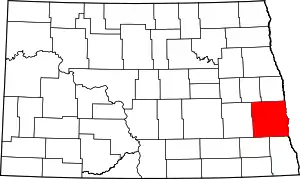Prairie Rose, North Dakota | |
|---|---|
 Location of Prairie Rose, North Dakota | |
| Coordinates: 46°49′02″N 96°50′07″W / 46.81722°N 96.83528°W | |
| Country | United States |
| State | North Dakota |
| County | Cass |
| Founded | 1975 |
| Incorporated | 1978 |
| Government | |
| • Mayor | Rick Callens |
| Area | |
| • Total | 0.04 sq mi (0.11 km2) |
| • Land | 0.04 sq mi (0.11 km2) |
| • Water | 0.00 sq mi (0.00 km2) |
| Elevation | 906 ft (276 m) |
| Population | |
| • Total | 56 |
| • Estimate (2022)[4] | 56 |
| • Density | 1,365.85/sq mi (530.32/km2) |
| Time zone | UTC-6 (Central (CST)) |
| • Summer (DST) | UTC-5 (CDT) |
| ZIP code | 58104 |
| Area code | 701 |
| FIPS code | 38-64320 |
| GNIS feature ID | 1036229[2] |
Prairie Rose is a city in Cass County, North Dakota, United States. The population was 56 at the 2020 census.[3] The city is an enclave suburb of Fargo. Prairie Rose was founded in 1975 and it was incorporated in 1978. There are 21 homes in the city.
There was an effort to merge with Fargo in 1996, but the vote by Prairie Rose residents failed.[5]
Geography
According to the United States Census Bureau, the city has a total area of 0.04 square miles (0.10 km2), all land.[6]
Demographics
| Census | Pop. | Note | %± |
|---|---|---|---|
| 1980 | 76 | — | |
| 1990 | 78 | 2.6% | |
| 2000 | 68 | −12.8% | |
| 2010 | 73 | 7.4% | |
| 2020 | 56 | −23.3% | |
| 2022 (est.) | 56 | [4] | 0.0% |
| U.S. Decennial Census[7] 2020 Census[3] | |||
2010 census
As of the census of 2010, there were 73 people, 25 households, and 21 families living in the city. The population density was 1,825.0 inhabitants per square mile (704.6/km2). There were 26 housing units at an average density of 650.0 per square mile (251.0/km2). The racial makeup of the city was 100.0% White.
There were 25 households, of which 44.0% had children under the age of 18 living with them, 76.0% were married couples living together, 4.0% had a female householder with no husband present, 4.0% had a male householder with no wife present, and 16.0% were non-families. 12.0% of all households were made up of individuals. The average household size was 2.92 and the average family size was 3.14.
The median age in the city was 41.8 years. 32.9% of residents were under the age of 18; 5.4% were between the ages of 18 and 24; 20.5% were from 25 to 44; 38.3% were from 45 to 64; and 2.7% were 65 years of age or older. The gender makeup of the city was 50.7% male and 49.3% female.
2000 census
As of the census of 2000, there were 68 people, 20 households and 19 families living in the city. The population density was 1,253.2 inhabitants per square mile (483.9/km2). There were 20 housing units at an average density of 368.6 per square mile (142.3/km2). The racial makeup of the city was 100.00% White.
There were 20 households, of which 65.0% had children under the age of 18 living with them, 95.0% were married couples living together, and 5.0% were non-families. 5.0% of all households were made up of individuals, and none had someone living alone who was 65 years of age or older. The average household size was 3.40 and the average family size was 3.53.
Age distribution was 35.3% under the age of 18, 7.4% from 18 to 24, 25.0% from 25 to 44, 32.4% from 45 to 64. The median age was 36 years. For every 100 females, there were 100.0 males. For every 100 females age 18 and over, there were 100.0 males.
The median household income was $75,000, and the median family income was $75,000. Males had a median income of $41,786 versus $25,000 for females. The per capita income for the city was $22,334. None of the population and none of the families were below the poverty line.
References
- ↑ "ArcGIS REST Services Directory". United States Census Bureau. Retrieved September 20, 2022.
- 1 2 U.S. Geological Survey Geographic Names Information System: Prairie Rose, North Dakota
- 1 2 3 "Explore Census Data". United States Census Bureau. Retrieved November 29, 2023.
- 1 2 "City and Town Population Totals: 2020-2022". United States Census Bureau. November 29, 2023. Retrieved November 29, 2023.
- ↑ "A small town surrounded: Tiny town circled by Fargo relishes independence". Archived from the original on March 4, 2016. Retrieved January 19, 2015.
- ↑ "US Gazetteer files 2010". United States Census Bureau. Archived from the original on January 25, 2012. Retrieved June 14, 2012.
- ↑ United States Census Bureau. "Census of Population and Housing". Retrieved July 22, 2013.
